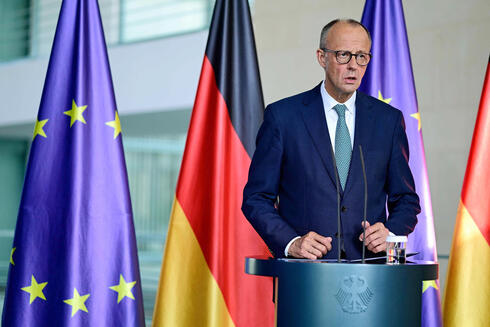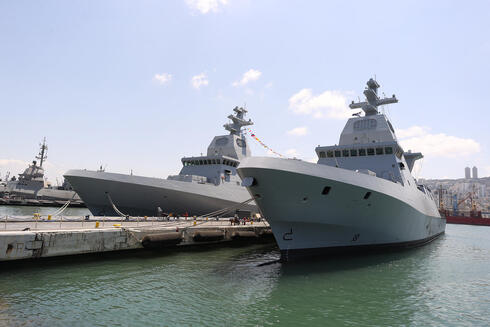
Germany’s embargo could trigger domino effect in arms bans against Israel
Defense experts warn of escalating global restrictions amid Gaza conflict and political isolation.
As the war in Gaza prolongs and becomes more complicated, the list of countries banning defense exports to Israel continues to grow. Over the weekend, Germany joined this list when Chancellor Friedrich Merz declared that his country would no longer provide Israel with security equipment that could be used by the IDF in its operations in the Gaza Strip. An arms embargo on Israel is not new, especially since the world has realized that Prime Minister Benjamin Netanyahu is using the war in Gaza for his political survival.
While restrictions on arms supplies from countries like Italy, Canada, the Netherlands, and Australia were received in Israel with some equanimity and viewed as a sacrifice to enable freedom to act in Gaza, Israel cannot afford to ignore Germany’s stance. This was reflected in Elbit Systems' stock, which fell sharply by 5.8% on Sunday. Germany remains one of Israel’s closest allies and is its second-largest arms supplier after the United States. The German announcement followed the Israeli cabinet’s decision on Friday to expand the war and occupy Gaza, despite warnings from the Chief of Staff and international allies.
The defense establishment remains silent on the German statement, leaving diplomats and politicians to try to soften the sanctions. In a weekend conversation with Merz, Netanyahu defended himself, reiterating familiar messages to his political base, claiming that “Germany is rewarding Hamas terrorism.”
Weapons Worth Half a Billion Euros
Merz is considered a friend of Israel. After the Christian Democratic Party’s election victory six months ago, he invited Netanyahu for an official visit, despite the International Criminal Court’s arrest warrant against him. Merz also visited Gaza-adjacent communities after October 7 and opposed his predecessor Olaf Scholz’s “quiet boycott” that reduced German weapons export licenses to Israel.
From the start of the Gaza war until mid-year, Germany supplied Israel with nearly half a billion euros worth of weapons and security equipment. About 30% of Israel’s security imports come from Germany, with 65% from the U.S. Germany supplies submarines and some ships used by the Israeli Navy.
The four Saar 6 ships, which began service early in the war, were built at TKMS shipyards in Germany after being purchased for roughly 430 million euros. In mid-2023, a few months before the war, Israel ordered three submarines from German company ThyssenKrupp for about 3 billion euros, expected to be delivered over the next decade.
Related articles:
Germany is also critical to the IDF’s land forces. The German company MTU designs, develops, and manufactures engines for Merkava tanks and armored personnel carriers. These vehicles are produced by the IDF and Ministry of Defense, but their engines are imported from the U.S., after being sent there from Germany for finishing. Israel buys them in the U.S. using security assistance funds, and the availability of these engines depends largely on Germany’s enforcement of its embargo. If the Chancellor enforces a full embargo, these engines will not leave MTU factories.
The availability of these engines is critical to the IDF, which has operated its tanks and APCs for almost two years. Without the ongoing war, these vehicles would have undergone full restoration by now. Sometimes IDF personnel restore engines to “like new” condition, but often full replacement is necessary.
The embargo’s cost will be paid in part by defense companies forced to find alternatives for every foreign supplier that closes its doors. Many components and raw materials for Israeli weapons systems come from Germany, forcing companies to seek costlier alternatives or develop in-house capabilities. Despite this, Israel’s defense industries have shown remarkable creativity in meeting these challenges amid a production surge to supply the IDF and global customers.
Towards Self-Supply
In response to embargo waves, the Defense Ministry and Elbit Systems decided to establish a national center for producing chemical compounds and explosives for all defense industries. After former U.S. President Joe Biden restricted heavy bomb supplies, Israel developed similar bombs domestically, again with Elbit’s help. Israel Shipyards received a historic order worth billions of shekels for future Navy warships.
Yet, local industries have limits. They cannot produce tank and APC engines or massive bombs for deeply buried targets. During the June Iran war, Israel relied heavily on American assistance to strike nuclear sites. Defense companies often face the consequences of Israeli government foreign policy, operating as businesses in a competitive, boycott-prone environment. Recently, industry leaders have warned of growing global negative sentiment towards Israel, reflected in slowing arms deals. In 2024, Israeli defense exports hit a record $14.8 billion due to demand mainly from Europe amid the Russia-Ukraine war, but future trends remain uncertain due to Israel’s political decline.
One major concern is that Germany’s embargo could trigger a domino effect, prompting other countries to impose similar restrictions. However, these sanctions are not expected to affect the largest deal in Israeli defense history, where Israel Aerospace Industries (IAI) is set to supply the Arrow 3 air defense system to Germany. This multi-year deal is worth approximately 14 billion shekels. The German Air Force commander, who recently visited Israel, also expressed interest in the accelerated Arrow 4 system development.
When it comes to air defense, Europe, facing the Russian missile threat, shows less sympathy for Gaza residents. Yet even these defense capabilities have their limits.


